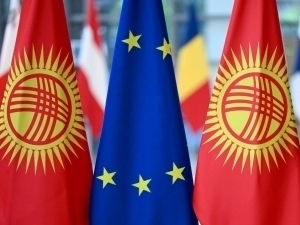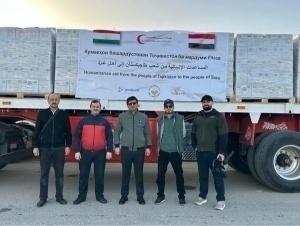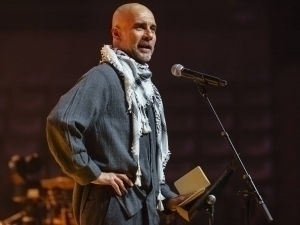The West abandoned Israel?
Review
−
22 May 2025 8794 10 minutes
Between 1933 and 1945, Hitler’s Germany carried out a campaign of extermination against the Jews, which became known as the Holocaust. According to confirmed data, a total of six million Jews were victims of Hitler’s genocide during these 12 years. This massacre played a significant role in the eventual establishment of a Jewish state, ending the Jews' status as a stateless nation.
Three years after the end of World War II, in 1948, the British mandate over the Palestinian territories, which Britain had controlled for many years, ended. In that year, the establishment of the state of Israel was announced on these lands. It can be said that the Jews gained their own state after enduring long years of oppression, and the international community, particularly political elites in Europe, expressed sympathy for this nation. Notably, Western political support for Israel continued beyond this point. This backing was rooted in a shared commitment to fight against the horrors of the Holocaust and a heightened sensitivity toward anti-Semitism. After Israel’s establishment, Tel Aviv repeatedly engaged in armed conflicts with neighboring Arab states. For many years, these conflicts were framed as Israel’s right to self-defense. While Israel did defend itself to some extent, this defense coincided with the occupation of lands belonging to neighboring countries, especially Palestinian territories. The Golan Heights, taken from Syria, and the shrinking Palestinian territories after 1948 and 1967 are clear examples of this.
Anti-Semitism, the Holocaust, and Jewish economic power, combined with influential lobbies and international sympathy, have largely silenced official voices opposing Israel’s 80-year apartheid-like oppression of Palestinians. This “green light” for Israel has persisted throughout some of the most horrific events in recent history, including those in the Gaza Strip. Hospitals, schools, and refugee camps—none of which posed any threat—have been destroyed. Children as young as a few days to five years old, along with women and the elderly, have been victims. These atrocities have continued for nearly 600 days in front of the entire world, all under the guise of Israel’s right to self-defense.
Compiling and quantifying the massacres committed by the Netanyahu regime in the Gaza Strip since October 2023 has become an extremely difficult task. South African lawyers and legal experts undertook this effort last year, producing more than 4,000 pages of documentation on Israeli actions in Gaza. However, neither protests from numerous countries nor the International Criminal Court’s arrest warrant for Netanyahu have stopped Israel’s actions. Everything depends on the pressure exerted by Israel’s main partners and close allies.
At the end of May 2025, this dynamic began to shift. Israel’s close Western partners, who have long covered up its crimes under the pretext of self-defense, are now distancing themselves one by one. Israel’s recent actions, which have turned Gaza—a territory housing about two million people—into an open-air concentration camp, have surpassed previous limits. European leaders have put the recognition of Palestine and even cutting trade ties with Israel, including arms supplies, on the agenda. Finally, the inhumane acts in Gaza are starting to have political consequences. Israel, which has for nearly a century leveraged the legacy of the Holocaust and the global fight against anti-Semitism, now faces an unexpected problem under Netanyahu. This is becoming Israel’s nightmare. The limited attention Gaza received after the Holocaust has now been overwhelmed by the brutality of Netanyahu and his administration in the past year and a half.
France-Britain-Canada triangle against Israel
Israel has blocked humanitarian aid from entering Gaza since March of this year. This means that for 80 days, no humanitarian aid has been allowed into the territory, where the humanitarian crisis has reached a critical level and social production has nearly collapsed. This blockade threatens the lives of more than two million Palestinians due to starvation. Reports of children dying from hunger and thirst have been constant each week in Gaza, where not a single grain of wheat has been allowed in for nearly three months. To meet the minimum living needs of Gaza’s population, approximately 500 trucks of aid and at least 50 trucks of fuel were required daily.
On May 16, Israel launched a new offensive campaign called "Gideon's Carts" in the northern and southern parts of the Gaza Strip. The Israel Defense Forces (IDF), as usual, claimed that the attacks were aimed at destroying Hamas targets. However, according to Gaza’s Health Ministry, 464 Palestinians were killed in Israeli attacks over the past week, including at least 130 in the most recent assault.
The blockade of humanitarian aid and the renewed violence have finally alarmed powerful European governments. Many countries on the continent are now seeking to distance themselves from Tel Aviv. This shift comes amid growing distrust of Western liberalism and the democratic model, driven by the ongoing massacres in Gaza. Both the United States and Europe have pressured Israel to halt these actions. Notably, this development followed the signing of record-breaking investment agreements between former U.S. President Donald Trump and three Arab states. Subsequently, Israeli Prime Minister Benjamin Netanyahu allowed food products to enter Gaza. Several sources in Israel reported that Netanyahu admitted in a cabinet meeting that this decision was made due to pressure from the United States. French President Emmanuel Macron’s initiative to lead a coalition of countries recognizing Palestine also significantly influenced Israel’s concessions.
The serious warnings from Great Britain and Canada, which have joined Macron’s still-forming coalition, further pressured Israel into temporary restraint. After Israel announced the launch of the "Gideon's Chariots" military offensive and Netanyahu’s intention to take full control of Gaza, the British government warned Tel Aviv of strict measures, including sanctions. London also expressed firm opposition to the expansion of Jewish settlements in the West Bank.
So far, the countries that have taken the strongest positions against Israel are Great Britain and France. Earlier, British Foreign Secretary David Lammy announced that London had suspended trade talks with Israel. The Foreign Office stated that negotiations on an agreement with Netanyahu’s government, which is “pursuing an unnatural policy in the West Bank and Gaza,” could not proceed. Additionally, Great Britain imposed sanctions on individuals and organizations involved in violence against Palestinians. Specifically, David Lammy announced sanctions on three individuals and four organizations linked to violence against Palestinians. However, these are not the last measures the British government plans to take against Israel. At the same time, the Israeli ambassador to London was summoned to the Foreign Office.
French President Emmanuel Macron is pursuing large-scale actions. He plans to organize a conference on the recognition of Palestine in New York this June, together with Saudi Arabia, under the auspices of the United Nations. Britain and Canada are also following this historic political step, which is expected to happen soon. Diplomatic sources report that these three countries are very close to recognizing Palestine officially. This decision was announced by British Foreign Secretary David Lammy in late April, who stated that Paris and London are engaged in serious talks on this issue.
Signal from the European Union
Almost simultaneously with Britain’s decision to suspend trade talks with Israel, on May 20 it was reported that 17 of the 27 EU member states could consider a similar approach. They supported a proposal put forward by Dutch Foreign Minister Caspar Veldkamp in early May. Under this plan, the EU’s executive body would launch an investigation into whether Israel has breached its human rights obligations under Article 2 of the association agreement between the two parties. This broad pact governs trade and diplomatic relations between the EU and Israel.
Article 2 states that the relationship will be based on respect for human rights and democratic principles, “which shall guide their domestic and international policies and constitute an essential element of this agreement.”
This proposal was initially introduced about a month and a half ago by Ireland and Spain, but Dublin and Madrid were unable to secure support from other EU countries at the time. Only recently have governments across Europe “opened their eyes” to the issue. The effort gained momentum after one of Israel’s closest allies, the Netherlands, proposed measures against Israel for violating Article 2 through the “humanitarian blockade.” Nine member states — Belgium, Finland, France, Ireland, Luxembourg, Portugal, Slovenia, Spain, and Sweden — openly backed the Dutch proposal ahead of the foreign ministers’ meeting on May 20. According to diplomatic sources, Denmark, Estonia, Malta, Poland, Romania, and Slovakia also supported the review on the same day. Even Austria, which has traditionally been a strong supporter of Israel, did not oppose the initiative. Notably, the EU’s chief diplomat, Kaia Kallas, who recently faced criticism in the European Parliament for describing Tel Aviv as a close EU ally, condemned Israel’s decision to allow a limited number of trucks into Gaza, calling it a “drop in the ocean.”
Did Trump fire Netanyahu?
It has been widely noted that Israel’s decision to allow humanitarian aid into Gaza, albeit in limited quantities, was largely influenced by pressure from Donald Trump and Emmanuel Macron. This pressure came shortly after the former US president’s visit to Middle Eastern monarchies.
After returning to the US, Trump told "Fox News" that one of the Arab leaders had informed him of the suffering in Gaza and urgently requested help. Trump said he immediately began working on the issue. Israel was compelled to act soon after, allowing dozens of aid trucks into Gaza.
According to "Axios", Trump was angered after seeing photos of children suffering in Gaza. The US president has since pushed his Middle East adviser, Steve Witkoff, to intensify efforts. Sources in Israel told "Axios" that they have not felt this pressure strongly. However, a significant rift has emerged between Washington and Tel Aviv, with one side led by a president seeking to stop the violence, and the other by a prime minister intent on expanding military operations.
"Axios" also points out that Trump’s current limited pressure has another goal. The outlet revealed that Trump recently pressured Netanyahu to make concessions on Gaza to prevent the potential reversal of highly profitable, multitrillion-dollar investment deals with three Arab states.
Israel's reaction
Israeli officials responded quickly to criticism from European leaders and the United States. The Foreign Ministry initially stated that there was no progress in trade negotiations with Britain, describing London’s sanctions as “mysterious” and “unfounded.” They added that external pressure would not force Israel to change its policies.
Foreign Ministry spokesman Oren Marmorstein also responded to the EU’s chief diplomat, Kaia Kallas. On his X platform account, he said the EU’s decision to review relations with Israel was baseless. Marmorstein argued that Israel is “on the defensive” in its war with Hamas.
He further emphasized that Israel remains open to negotiations with EU representatives and member states to resolve the issue. It is important to note that the EU is Israel’s largest trading partner, with annual trade between the two exceeding 45 billion euros.
Live
All8 nafar xitoylik Baykal ko'liga cho'kib ketdi
22 February




